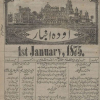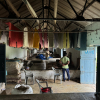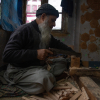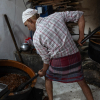Gondhal literally means ‘chaos’ in Marathi. It is a caste-based form of livelihood. Most of the performers, called Gondhali, belong to the Mahar-Mang (Scheduled Castes) communities even today. They perform in rural Maharashtra and parts of Karnataka in praise of King Khandoba. The practice, in a more spiritualised avatar, spread further during the Bhakti movement in the eleventh and twelfth centuries. Gondhal is significant due to its educative yet entertaining form as a folk art. It is believed that if Gondhal is performed just before an auspicious occasion, the event will go smoothly. Gondhalis
Interviewer (I): You have been working for ten years in this industry?
Vijay Jagdade (VJ): Yes. I used to work in Tamasha before this. A person from our community helped me. In what language should I speak? Hindi, Marathi or Ahirani?
VJ: I used to work in a farm along with my parents. And I am the son of a poor farmer.
VJ: Jai Malhar! Actors in the Jai Malhar TV serial take at least 1–2 months to prepare and practice for their roles. And on TV we see half an hour to hour-long episodes. On the other hand, we can persuade audiences to stay for longer, we can entertain them. We perform live, standing all night in front of our audience. It is not like TV. Our day begins early in the morning; and work continues all night. I don’t think serial actors can do this much hard work! And the next day it continues again; we cannot sleep during Gondhal. Can you ask the TV actors to perform like us without sleep? They cannot.
Bapu Ahire (BA): Gondhal is just a means to fill our stomachs. We are not claiming to spread any spirituality here. No God has suggested the killing of any goat or sheep. They don't need animals. All this happens in the name of tradition. Our ancestors have fulfilled it. Now we continue it. Most of the middle castes and peasant classes are devotees of King Khandoba. They are the ones who host the Gondhal. But they need us to perform. Those people from upper peasant castes come to us and ask us to perform. This is our livelihood so we have to put up the performance. Gondhal is an inherited art of the Mahar community. No one can take this art form from us.
(Song in the praise of King Khandoba)
Samadhan (S): In the night, I apply make-up to play the role of Banubai. I work as a Murali in the troupe. Khandoba's Muralis have to sing and dance. What is the story of King Khandoba? This story is about Khandoba and his two wives: Mhalsa and Banu. Muralis take on their roles and reenact their story. The story is about King Khandoba marrying two queens from different castes. We have to narrate it through our act.
VJ: We have this art form for survival and we are earning enough. And filling our stomachs. We will do this work till we die.
(Song in the praise of King Khandoba)
S: Banu is the consort of Khandoba, she has a very important role in this story. Today I will play her role. My friend, he plays the role of Mhalsa. Another member of the troupe plays Khandoba.
BA: My father's father was the first Gondhali of my area. My father followed his father's footsteps. And now I am doing the same. None of us has seen God till now. Brothers Mani and Malya were sons of Kotum Daitya (a demon). Khandoba took on the incarnation of Martand Bhairav to defeat them in war. Yet, the brothers were undefeatable. They demanded that whenever Khandoba is remembered their names be recited first. They said that because they are demons, and nobody would remember them. Thus, we say ‘Yedkot Yedkot Jai Malhar!’
S: It is said that Banubai, a Dhangar princess, owned 9 lakh sheep. Khandoba wished to try and gain her attention. He devised a plan to woo her. One day Banubai gave work to an old man who was, in fact, Khandoba in disguise. She asked him to take her cattle to the river Yum to bathe them. And to bring them back to the palace by evening. But Khandoba had other plans. He killed the cattle, separated the wool from the skin, chopped the meat. Banubai's slaves, who went to the Yum River, saw this. They ran back to the palace and relayed what they saw to her. The slaves told Banubai, ‘The old man you put to work, has killed all your cattle, and ruined your wealth.’ Upon hearing this Banubai began weeping as this was a huge loss. She wondered how she would survive without her cattle. She ordered her slaves to find and kill the old man. The slaves began to gather axes, spears and wooden sticks to kill him. Meanwhile, the old man, who was actually King Khandoba, applied turmeric to all the cattle, and brought them back to life. Khandoba ordered the slaves to tell their mistress that her cattle were alive again. He added, ‘Tell your mistress to give me some food to eat.’ The slaves went back to Banubai and asked her not to cry. On being asked why, the slaves replied, trying to pull her leg, ‘Because we killed the old man.’ But, later, they told her the truth. How the old man was the one who brought her animals back to life. Banubai became very happy when she heard this. Gondhal is for entertainment. People should be entertained.
BA: They should eat meat, drink alcohol and enjoy the Gondhal. If you go to buy meat right now, it’s so expensive. A common man like us cannot afford it. So, go to Gondhal and eat as much you can. In the night, enjoy the programme of Gondhal, entertain yourself. Spend some money and go back home. The performing of Gondhal is practiced by the Jai Bhim community (Mahars). My grandfather and father used to perform in funerals.
VJ: Our community was given a boon, the gift of playing the Sambhal. Nobody outside of our community can play this instrument. I am a man in the day. In the night I turn into a woman, for the sake of my work. Just like the men who dress up in Tamasha. It is part of the business. They get married, we will also, someday.













